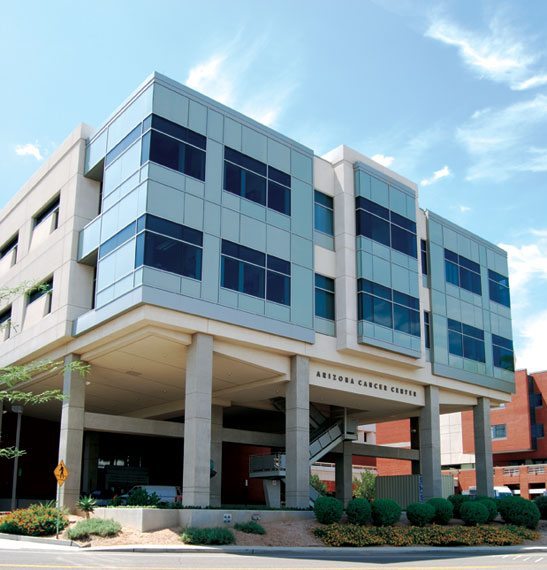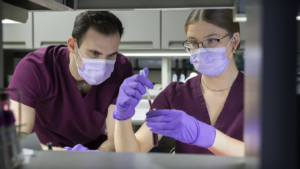The Arizona Cancer Center in Tucson is one of two NCI-designated Comprehensive Cancer Centers in Arizona. Photo: The Arizona Health Sciences Center at the University of Arizona in Tucson
Cancer Conquerors:
There was a time when a diagnosis of cancer almost always meant death. But advances in cancer research and treatment have greatly improved cancer patients’ chances of survival. Throughout the Valley and Arizona, cancer centers touting new technologies and treatments are helping the state become one of the nation’s leaders in the fight against the disease.
“With these various models … it is raising the quality of cancer treatment for everybody in the Valley (and state)” says Dr. Michael Etzl Jr., director of the Center for Cancer and Blood Disorders and co-director of the neuro-oncology program at Phoenix Children’s Hospital.
Comprehensive Care Centers
Since 1976, the Arizona Cancer Center at the University of Arizona Health Sciences Center in Tucson has been a pioneer in the fight against cancer. Designated by the National Cancer Institute (NCI) as one of just two Comprehensive Cancer Centers in Arizona, the facility serves the entire state.
“Because of our Comprehensive Cancer Center status, our emphasis on research and our role as part of an academic medical center, we can offer our patients the opportunity to be part of clinical trials, to be treated with newly developed drugs specifically for their particular disease,” says Dr. David S. Alberts, director of the Arizona Cancer Center.
The only other NCI-designated Comprehensive Cancer Center in Arizona is the Mayo Clinic Cancer Center in Scottsdale.
“Mayo’s unique approach to health care is a team approach, with many health care providers working to provide comprehensive diagnosis and treatment in more than 65 adult medical and surgical specialties,” says Dr. Rafael Fonseca, deputy director of the Mayo Clinic Cancer Center and site director in Arizona.
Clinical Trials and Research
Research and clinical trials are the critical basis for innovations in cancer treatment. Arizona is able to position itself as a leader in cancer treatment because of the research and clinical trials its hospitals and centers host.
“It is a documented fact that the best cancer care can only occur at centers where clinical trials are being conducted,” Fonseca says.
The Arizona Cancer Center in Tucson has an annual research budget of more than $78 million, operates 60 research labs and enrolls more than 1,700 participants in clinical trials each year.
In the Valley, Scottsdale Healthcare also offers cancer patients cutting edge clinical trials by being a clinical research site for the Translational Genomics Research Institute (TGen). Through a strategic alliance between Scottsdale Healthcare and TGen, eligible patients can take part in phase I or phase II studies at TGen’s Clinical Research Services clinic, located within the Virginia G. Piper Cancer Center at Scottsdale Healthcare Shea Medical Center.
Since 2005, more than 60 phase I (first-in-human) cancer trials have been conducted through TGen Clinical Research Services at Scottsdale Healthcare. Approximately 250-300 new patients participate in other phase I trials every year through the Virginia G. Piper Cancer Center.
In a field vastly different from that of adult cancer, Phoenix Children’s is the only hospital in the state to offer pediatric phase I, phase II and phase III trials.
“In pediatric oncology, without the clinical research component of it you really don’t provide cutting-edge treatment,” Etzl says.
Approximately 60 to 70 percent of cancer patients at Phoenix Children’s are on clinical trials.
Pioneering Programs
Along with its research and clinical trials, Phoenix Children’s Hospital prides itself on having a “strong, family-centered, comprehensive program” for young cancer patients, Etzl says.
One of the hospital’s numerous programs includes Child Life, which works to ease a child’s pain and worry about being in a hospital. Through the program, procedures are explained to children as part of an overall effort to make a young cancer patient’s life as normal as possible.
The cancer center at St. Joseph’s Hospital and Medical Center in Downtown Phoenix hosts programs ranging from nutritional support to quality-of-life care that focus on a blend of medical, holistic and emotional support systems.
Meanwhile, an initiative at the Virginia G. Piper Cancer Center that is open to all cancer patients — regardless of where they’re receiving treatment — is the cancer care coordinator program. It’s comprised of experienced oncology nurses who act as personal advocates for cancer patients by answering questions, clarifying procedures and more.
Collaboration and Partnerships
Dr. Mark A. Slater, vice president of research for Scottsdale Healthcare and the Scottsdale Clinical Research Institute at the Virginia G. Piper Cancer Center, says that with so much cancer treatment and research taking place in the Valley and state, it’s important to “work together to fight cancer and not duplicate each other (and) instead complement each other.”
The Virginia G. Piper Cancer Center continues to expand its alliance with TGen. The center recently announced it will be one of three clinical research sites in the U.S. to participate in a three-year investigation into new ways to treat pancreatic cancer.
Since 2002, the Mayo Clinic Cancer Center and Phoenix Children’s have worked together on the Valley’s first pediatric blood-and-marrow transplant program.
“Prior to 2002, if a (Phoenix Children’s) patient needed a transplant, the patient and his or her family had to leave the Phoenix area, often for months at a time, to seek care,” Fonseca of Mayo says.
Today, the two institutions have successfully forged a strong relationship that helps patients young and old. “The program has grown exponentially,” Fonseca says. “This year we will perform approximately 120 transplants.”
The Future
As the next phase of cancer care makes its way to the state, one new option for patients is the Cancer Treatment Centers of America at Western Regional Medical Center in Goodyear, which opened in December 2008. Cancer Treatment Centers of America has other locations in Chicago, Philadelphia and Tulsa, Okla.
The center in Phoenix is the first in the country to be 100-percent digital, with a fully electronic health record system designed specifically to support Cancer Treatment Centers of America’s unique model of care.
“The (electronic health record system) is one part of our comprehensive IT platforms designed to maximize patient care. Cancer patients will benefit from greater efficiency created by real-time access to patient data and more,” says David Veillette, president and CEO of Cancer Treatment Centers of America at Western Regional Medical Center.
Another option coming online in a few years will be the M.D. Anderson Banner Cancer Center on the campus of Banner Gateway Medical Center in the East Valley. The recently announced collaboration between the University of Texas M.D. Anderson Cancer Center is Banner’s largest ever, with a scheduled opening of 2011.
“Cancer treatment will be needed more, naturally, as a result of more people moving into the Valley and the state,” says Bill Byron, a spokesperson for Banner Health. “The M. D. Anderson Banner Cancer Center will be a prominent institution that many will choose.”
Along with new technology, research and treatments, each cancer center in the state offers patients perhaps the most potent medicine of all — hope.
“We foresee a future where cancer will be like infectious diseases — most of the time curable,” Fonseca says.
www.azcc.arizona.edu | www.mayoclinic.org/scottsdale | www.cancercenter.com | www.phoenixchildrens.com | www.stjosephs-phx.org | www.shc.org | www.mdanderson.org | www.bannerhealth.com




